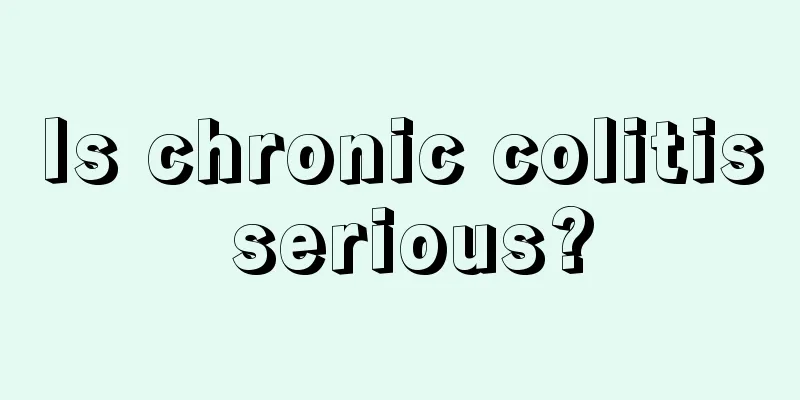Is chronic colitis serious?

|
Although many people have heard of colitis, they don’t know what it is. Colitis varies in severity from case to case. Some severe cases of colitis will affect your life. Generally speaking, the main symptoms of colitis are constipation and bleeding. People in serious condition may also experience dizziness and general weakness. Moreover, colitis is difficult to cure and usually recurs repeatedly. Severe cases may result in death. 1. Toxic intestinal dilatation: The clinical manifestations are rapid deterioration of the disease and obvious symptoms of poisoning, accompanied by diarrhea, abdominal tenderness and rebound pain, weakened or disappeared bowel sounds, increased white blood cell count, and easy complications of intestinal perforation. 2. Intestinal stenosis: It often occurs in cases with extensive lesions and a duration of more than 5-25 years. The location is mostly in the left colon, sigmoid colon or rectum. It is generally asymptomatic clinically. In severe cases, it can cause intestinal obstruction. When intestinal stenosis occurs in this disease, one must be alert to tumors and distinguish between benign and malignant. 3. Intestinal perforation: It is mostly a complication of toxic intestinal dilatation, but may also be severe, often occurring in the left colon. The use of corticosteroids is considered a risk factor for intestinal perforation. 4. A lot of blood in the stool: Blood in the stool is one of the main clinical manifestations of this disease, and the amount of blood in the stool is also an indicator of the severity of the disease. 5. Colon cancer: About 5% of cases develop cancer, which is more common in patients with lesions involving the entire colon, onset in childhood and a history of more than 10 years. 6. Diarrhea Diarrhea is the most common symptom of colitis, and there are many abnormal stools such as bloody stools, watery stools, mucous stools, and loose stools. In mild cases, bowel movements occur every 1 to 2 hours, and the stool is sometimes filled with mucus, pus, and blood, or watery stool without feces. 5% of patients with ulcerative colitis may experience constipation, which is mostly a case of enteritis. Because there is blood in the stool, it is often mistaken for hemorrhoidal bleeding. 7. Constipation Colitis and proctitis are the causes of constipation, which can be caused by systemic metabolic disorders, nervous system diseases, or small anal fissures in the anus. 8. Tips Patients with chronic enteritis need to eliminate symptoms of intestinal inflammation and restore the balance of intestinal flora. Symptomatic treatment alone (such as taking laxatives or antidiarrheal drugs) cannot cure the disease. In addition, antibiotics destroy the balance of intestinal microecology. If they must be used, please use them in combination with probiotic preparations. |
<<: What are the symptoms of blood disease
>>: How is Vitiligo Syndrome treated?
Recommend
The impact of eating on blood tests
Blood tests are a very common method of examinati...
Do tangerines cause internal heat?
Many people like to eat oranges in life, and autu...
Postoperative adjuvant radiotherapy can improve the survival rate of pancreatic cancer patients
Radical surgical resection is currently the only ...
These three steps can easily solve myelodysplastic syndrome
Myelodysplastic syndrome is a very common disease...
How to remove oil stains from clothes
I believe everyone has encountered such a situati...
What to do if your hands are spicier from garlic
Garlic has a pungent smell, which is why many peo...
What are the postoperative care for gastric cancer? Pay attention to these five points
After gastric cancer surgery, in order to effecti...
Dumping syndrome after gastric cancer surgery and health care methods
Gastric cancer originates from the mucosal epithe...
Some tips for treating insomnia at night
For the treatment of insomnia, early diagnosis, p...
The initial treatment of thyroid cancer should not be ignored
Patients with thyroid cancer all hope to be cured...
How to grow 20cm taller
For adolescent children, it is a relatively simpl...
Is propylene glycol harmful to the human body?
When it comes to the chemical reagent propylene g...
It is better to have a random check than to check it all over again
one She is 49 years old and a Uyghur herdsman. A ...
Does the bathroom have a strong odor? Put up these potted plants now!
In daily life, we often find that the bathroom wi...
Is it better to have a fast or slow heart rate?
Heart rate refers to the number of times the hear...









